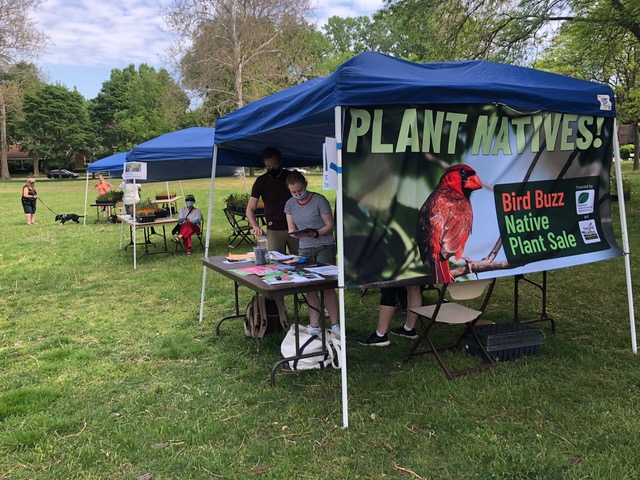Evanston native plant sale blossoms to benefit birds, bugs
Last year’s Bird Buzz Plant Sale at the Lorraine H. Morton Civic Center. The order form for this year’s sale is open now, and plant pickup will be May 21.
April 21, 2022
When longtime Evanston resident Laine Hoffman looks out her window at night, she said her yard is aglow with lightning bugs. Across the fence, her neighbors’ yards are dark, she said.
The difference? Hoffman said she is selective with what she plants in her garden.
“All my plants down in the garden, unless they were already there before, are native,” Hoffman said.
This spring, the second annual Bird Buzz Native Plant Sale hopes to encourage more Evanston residents to grow native plants like Hoffman. Founder and Lead Leslie Shad of Natural Habitat Evanston said local species offer food and shelter to insects and birds native to the area.
The sale is organized by the Evanston Environmental Association and Natural Habitat Evanston, two local organizations dedicated to preserving and restoring Evanston nature.
The sale’s organizers, Shad of Natural Habitat Evanston and Julia Bunn of the Evanston Environmental Association, said they hope to combat declining bird and insect populations, which are a result of pesticide use and a focus on exotic plants.
Nonlocal plant cultivation leads to a lack of food for local insects, Shad said.
“In the last 50 years or so, a lot of our gardens have relied on non-native plants and cultivars,” Shad said. “But if you’re planting a plant from Europe or Asia, that plant coevolved with insects from Europe or Asia.”
Last May, Natural Habitat Evanston, in partnership with the Evanston Host Plant Initiative, found the population of the rusty patched bumble bee, a species native to the greater Chicago area sustained by native plants, declined about 87% in the last 20 years.
Bunn said it’s important to sustain the bugs and birds that have always called the Evanston area home.
“Native insects and birds have no place to eat and reproduce anymore,” Bunn said. “We need to rewild the world. We need to create spaces that invite nature back home.”
Last year, the plant sale sold out, so organizers decided to double the number of plants in their inventory for this year’s sale, Bunn said. The order form opened online in February, and Bunn said the sale has already surpassed the number of plants sold last year.
Hoffman, who volunteered in last year’s sale, said she is excited to participate again and see Evanston’s growing efforts toward environmentalism.
Bunn said the plants are sourced from local growers like Pizzo Native Plant Nursery in Leland, IL, who make sure the plants’ seed and parent heritages comes from within about 100 miles of Chicago.
For those looking to begin planting native plants, Bunn suggests looking into three native options for grass substitutes: James’ sedge, rosey sedge and oak sedge. Bunn said sedges, a type of ground cover plant, do not need to be mowed and help local insects.
Shad said she recommends oaks.
“The very best thing you can plant in the United States is an oak,” Shad said, adding that oaks support more than 500 caterpillar species. “By growing more plants that support a diverse group of caterpillar, you’re also feeding more birds, other caterpillars and chipmunks and all kinds of different things as well.”
Customers can pick up their orders on May 21 from 9:30 a.m. to 1:30 p.m. at the Lorraine H. Morton Civic Center parking lot. They are encouraged to bring boxes or bags to collect their plants.
Correction: This story has been updated to include Pizzo Native Plant Nursery after a source misstated the native plant criteria followed by local growers featured in the piece. The Daily regrets the error.
Email: [email protected]
Twitter: @kelly_cloonan
Related Stories:
— Edible Evanston promotes food growing and sharing, education in community with Food Forest
— ‘A reunion of the environmental community:’ Evanston celebrates Earth Month this April
— The monarch butterfly population might be declining. Here’s what you can do


